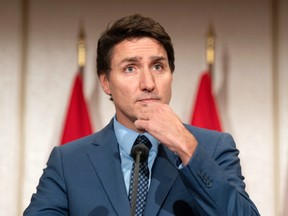Trudeau says his government has ‘always exercised fiscal restraint’
[ad_1]
Finance Minister Chrystia Freeland is set to present next week what she promised would be a ‘responsible fiscal plan’

Article content
OTTAWA – Prime Minister Justin Trudeau said Friday that his government has “always exercised fiscal restraint,” as he prepares for the Liberals’ fall economic update next week that Conservative Leader Pierre Poilievre is saying needs to include a plan to balance the budget, as well as relief from scheduled carbon tax increases.
“I propose a compromise. No more hikes,” said Poilievre during a press conference on Friday as he made his short list of demands known ahead of the fall economic statement.
Advertisement 2
Article content
Article content
Finance Minister Chrystia Freeland is set to present next week what she promised would be a “responsible fiscal plan” which would also allow the government to “invest in what Canadians need right now.” She promised the update would focus on affordability and housing.
Poilievre blamed government spending for many of the problems afflicting Canada right now, such as record food bank usage and tent cities appearing across the country.
“(Trudeau) has added over $600 billion of inflationary debt, more debt than all prior prime ministers combined, doubling our debt. He’s flooded our economy with easy money, which has bid up the cost of the goods we buy and the interest we pay,” said Poilievre.
“On top of that, he’s brought any massive carbon tax on gas, heat, and everything that is transported by truck. The consequences have been devastating.”
(Trudeau) has added over $600 billion of inflationary debt, more debt than all prior prime ministers combined
Pierre Poilievre
Speaking in San Francisco, Trudeau boasted about his government’s track record while painting a rosier picture than Poilievre of Canada’s economy in comparison to its international partners.
“We have the lowest deficit in the G7. We have the best debt-to-GDP ratio in the G7… We are one of the three largest economies in the world that is rated by independent rating agencies at a triple-A, top tier economy, with a responsible fiscal track,” he said.
Advertisement 3
Article content
“One of the ways we have done that is by not doing what Conservative politicians would want and cutting programs and services to Canadians, but by delivering supports for Canadians.”
Trudeau mentioned child care and dental care as social policies that he deems are also economic policies, and pointed out that Conservatives voted against those measures.
“That’s more of what I’m excited to share next week with the fall economic update: a demonstration that we know how to continue to be fiscally responsible while we make the investments that are going to grow the economy and support Canadians,” he said.
Poilievre also called on the government to adopt his housing bill aimed at speeding up the construction of new housing in cities with predetermined targets while providing a GST rebate on new residential rental properties for which the average rent is below market rate.
The government has argued that Poilievre’s bill would in fact be more bureaucratic than their own housing plan set out in Bill C-56, which seeks to eliminate the GST for all new rentals. The NDP has agreed to speed up the Liberal bill next week in exchange for a series of amendments.
Advertisement 4
Article content
Those changes include applying the GST exemption to co-operative units and more stringent measures to ensure more competition in the grocery sector.
“Although we didn’t get everything we wanted, and an NDP government would crack down even more on the corporate greed driving up grocery costs, we were able to make improvements,” said NDP finance critic Daniel Blaikie in a statement sent Friday evening.
The government’s fiscal update comes at a time where the economy is slowing down and where pressure is high to keep up with the NDP’s demands to maintain the deal with the Liberals.
NDP leader Jagmeet Singh has said that he does not expect a national pharmacare plan to appear in next week’s fall economic statement but remained optimistic that the government would soon table a framework for such a program which would cost billions per year.
Recent projections from the parliamentary budget officer show that the federal deficit is projected to rise to $46.5 billion in 2023-24 due to slower revenue growth and higher expenses, and would go down to $8.2 billion in 2028-2029 assuming there is no new spending.
Just last year, federal projections were projecting a surplus in the 2027-2028 fiscal year.
National Post
Related Stories
Our website is the place for the latest breaking news, exclusive scoops, longreads and provocative commentary. Please bookmark nationalpost.com and sign up for our newsletters here.
Article content
[ad_2]
Read More:Trudeau says his government has ‘always exercised fiscal restraint’



Comments
Postmedia is committed to maintaining a lively but civil forum for discussion and encourage all readers to share their views on our articles. Comments may take up to an hour for moderation before appearing on the site. We ask you to keep your comments relevant and respectful. We have enabled email notifications—you will now receive an email if you receive a reply to your comment, there is an update to a comment thread you follow or if a user you follow comments. Visit our Community Guidelines for more information and details on how to adjust your email settings.